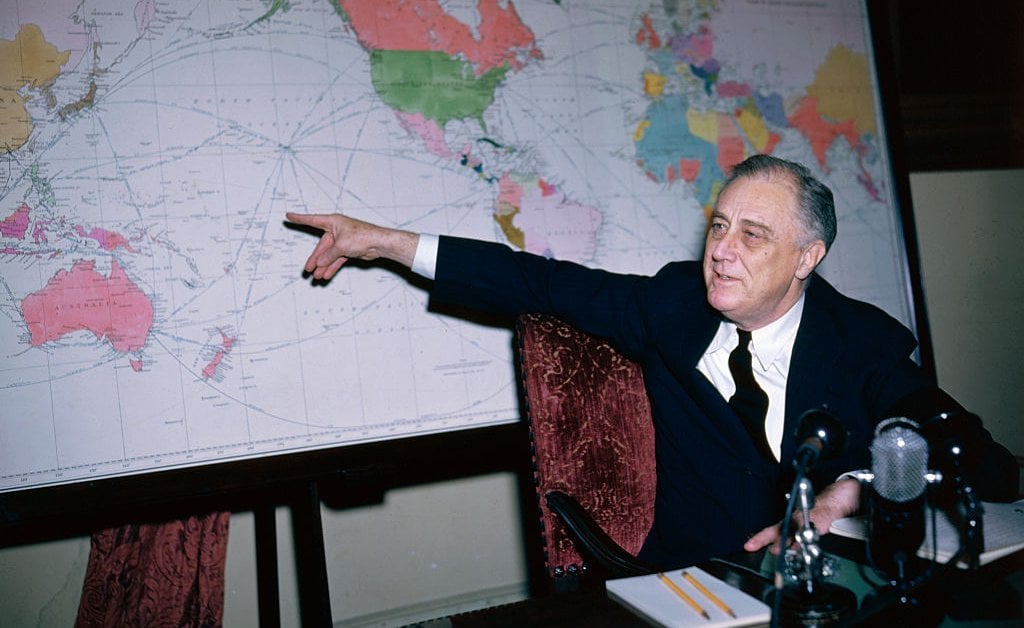
President Donald Trump’s return to the White House has unleashed a flood of anxiety over the potential demise of what is commonly known as the post-World War II order, with its emphasis on international alliances, free trade, and respect for sovereign borders.
Before and during World War II, President Franklin D. Roosevelt helped shepherd a system into existence which aimed to combat the belief that might makes right; massive economic inequality; the adoption of restrictive trade policies that set former friends and allies against one another; and authoritarian regimes strengthening their hold on power and preying on their neighbors. It was also intended to counter the isolationism of the 1930s and Americans’ all-too-common tendency to see themselves as living in a world apart, protected by the Atlantic and Pacific oceans.
The creation of the American-led international system we live in today did not simply drop out of the sky. It came about by design—a design animated by Roosevelt’s profound belief in the links between the onset of the Great Depression and the eruption of the most destructive war in human history.
Roosevelt also set out to restore the American people’s faith in democracy at home. He recognized that the misery caused by the Depression had led many Americans—like their counterparts in Europe and Asia—to question the efficacy of democratic government. The raft of programs and laws Roosevelt and Congress enacted during this included Social Security, unemployment insurance, a massive investment in public works, and financial reforms that helped restore the credibility of America’s banking and financial sector.
He also embraced an effort to reverse the disastrous 1930 Smoot-Hawley Tariff, understing that tariffs were a tax on poor and working Americans and regarded the use of the progressive income tax as a much more equitable—and economically advantageous—means of raising revenue. He also comprehended the terrible impact the 1930 tariff, the second highest in U.S. history, had on the domestic and global economy. It increased costs at home and strangled international trade as other nations—including Great Britain, Canada, and much of Europe—retaliated.
In 1934, this effort culminated in the Reciprocal Trade Agreements Act (RTAA), which gave the executive branch the power to negotiate trade agreements. the vast majority of those negotiated were used to lower existing tariffs. It was this process that gave birth to the multilateral rules-based freer trading system that expanded over the second half of the 20th century.
When Adolf Hitler plunged the world into war in September 1939, it unleashed a fierce debate in the U.S. about avoiding any involvement in the war. By 1940, those who opposed U.S. involvement had coalesced into the powerful America First movement. Roosevelt nevertheless managed to send aid to allies.
After the war, to prevent a return of isolationism, Roosevelt led the negotiations that produced the Bretton Woods Accords, which created the International Monetary Fund and World Bank and the establishment of the United Nations.
Roosevelt’s crucial insight was that the costs of such trade wars aren’t just economic—they can also be political and dangerous. A trade war stands to not only weaken the Western alliance at the very moment when China is on the rise and Europe is facing its first major conflict since the end of World War II, it also comes at a time when—thanks to vast economic inequality—the efficacy of democratic government is being challenged by the similar of populist anti-democratic forces that emerged in the 1930s.
https://time.com/7276697/the-perils-of-jettisoning-the-world-franklin-roosevelt-created/
Posted by Naurgul
2 comments
I’ve been wondering how many civil wars and coups the “Liberation Day” tariffs were going to trigger as they drive other countries’ economies into a recession/depression. Also been thinking about, with the cuts to USAID, antivax rhetoric, etc, what will the body count be for this administration.
[This song](https://www.youtube.com/watch?v=d22CiKMPpaY) seems oddly appropriate. And no matter how well you think you know the song and movie, you probably don’t remember the phrase “Hearts full of passion, jealousy and hate”.
BTW, “hearts full of passion, jealousy and hate” can do a huge amount of damage, but they won’t win in the end. I asked about that, [Mr. Wilson](https://en.wikipedia.org/wiki/Dooley_Wilson) promised it, and [Ms. Bergman](https://en.wikipedia.org/wiki/Ingrid_Bergman) and [Mr. Bogart](https://en.wikipedia.org/wiki/Humphrey_Bogart) did too.
Comments are closed.